Introduction
Angkor derives from a Sanskrit word meaning ‘holy city’; ‘Wat’ in Khmer means ‘temple’. Angkor Wat, located 5.5 km north of the modern town of Siem Reap in northeast Cambodia represents a whole complex of wonderful temples and stonemasonry and artwork throughout this area. It is a UNESCO world heritage site and is one of the most important archaeological sites in South-East Asia besides being the single largest religious structure in the world, and surely one of the world’s wonders of art and architecture.
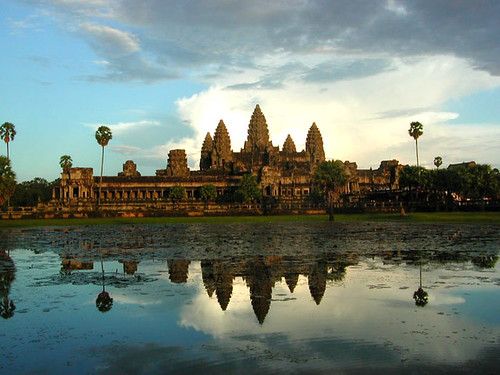
The temples of Angkor were built by the Khmer civilization between 802 and 1220 AD. From Angkor the Khmer kings ruled over a vast domain that reached from Vietnam to China to the Bay of Bengal. Within an area of 120 sq. miles, the ruins contain some of the most imposing monuments in the world, including about a thousand temples, mainly Hindu and some Buddhist; the ancient city, however, had an extent some three times that size, and was home to perhaps 750,000 people. The structures one sees at Angkor today, more than 100 stone temples in all, are the surviving remains of a grand religious, social and administrative metropolis whose other buildings – palaces, public buildings, and houses – were built of wood and have long since decayed and disappeared. Angkor Wat was re-discovered by a French man about 150 years ago among heavy forestry, ready to become one of the most visited archaeological and artistic sites on the planet.
History
The initial design and construction of Angkor Wat took place in the first half of the 12th century, during the reign of Suryavarman II (1113 – c. 1150). Dedicated to Vishnu, it was built as the king’s state temple and capital city. As neither the foundation nor any contemporary inscriptions referring to the temple have been found, its original name is unknown, but it may have been known as Vrah Vishnulok after the presiding deity. Work seems to have ended shortly after the king’s death, leaving some of the bas-relief decoration unfinished. In 1177, approximately 27 years after the death of Suryavarman II, Angkor was sacked by the Chams, the traditional enemies of the Khmer. Thereafter the empire was restored by a new king, Jayavarman VII, who established a new capital and state temple (Angkor Thom and the Bayon respectively) a few kilometres to the north.
In the late 13th century, Angkor Wat gradually moved from Hindu to Theravada Buddhist use, which continues to the present day. Angkor Wat is unusual among the Angkor temples in that although it was somewhat neglected after the 16th century it was never completely abandoned, its preservation being due in part to the fact that its moat also provided some protection from encroachment by the jungle.
The true history of Angkor Wat was pieced together only from stylistic and epigraphic evidence accumulated during the clearing and restoration work carried out across the whole Angkor site. There were no ordinary dwellings or houses or other signs of settlement including cooking utensils, weapons, or items of clothing usually found at ancient sites. Instead there is the evidence of the monuments themselves.
Angkor Wat required considerable restoration in the 20th century, mainly the removal of accumulated earth and vegetation. Work was interrupted by the civil war and Khmer Rouge control of the country during the 1970s and 1980s, but relatively little damage was done during this period other than the theft and destruction of mostly post-Angkorian statues.
The temple is a powerful symbol of Cambodia, and is a source of great national pride that has factored into Cambodia’s diplomatic relations with its neighbour Thailand, France and the United States. The splendid artistic legacy of Angkor Wat and other Khmer monuments in the Angkor region led directly to France adopting Cambodia as a protectorate on 11 August 1863. This quickly led to Cambodia reclaiming lands in the northwestern corner of the country that had been under Thai control since the Thai invasion of 1431 AD. Cambodia gained independence from France on 9 November 1953 and has controlled Angkor Wat since that time.
Angkor Wat Today
Since the 1990s, Angkor Wat has seen continued conservation efforts and a massive increase in tourism. The temple is part of the Angkor World Heritage Site, established in 1992, which has provided some funding and has encouraged the Cambodian government to protect the site. A survey found that around 20% of the devatas were in very poor condition, mainly because of natural erosion and deterioration of the stone but in part also due to earlier restoration efforts. Other work involves the repair of collapsed sections of the structure, and prevention of further collapse.
Angkor Wat has become a major tourist destination. In 2004 and 2005, government figures suggest that, respectively, 561,000 and 677,000 foreign visitors arrived in Siem Reap province, approximately 50% of all foreign tourists in Cambodia for both years. The influx of tourists has so far caused relatively little damage, other than some graffiti; ropes and wooden steps have been introduced to protect the bas-reliefs and floors, respectively. Tourism has also provided some additional funds for maintenance—as of 2000 approximately 28% of ticket revenues across the whole Angkor site was spent on the temples—although most work is carried out by foreign government sponsored teams rather than by the Cambodian authorities.
Architecture and Style
Angkor Wat is the prime example of the classical style of Khmer architecture—the Angkor Wat style—to which it has given its name. By the 12th century Khmer architects had become skilled and confident in the use of sandstone (rather than brick or laterite) as the main building material. Most of the visible areas are of sandstone blocks, while laterite was used for the outer wall and for hidden structural parts.
Angkor Wat is a unique combination of the temple mountain, the standard design for the empire’s state temples, the later plan of concentric galleries, and influences from Orissa and the Chola of Tamil Nadu, India. The temple is a representation of Mount Meru, the home of the gods: the central quincunx of towers symbolises the five peaks of the mountain, and the walls and moat the surrounding mountain ranges and ocean. Access to the upper areas of the temple was progressively more exclusive, with the laity being admitted only to the lowest level.
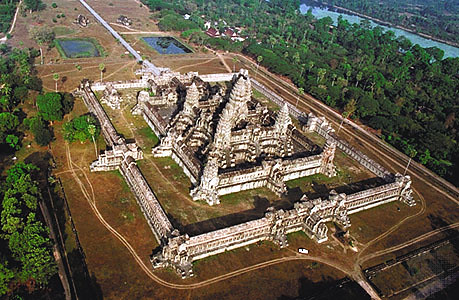
Angkor Wat has drawn praise above all for the harmony of its design, which has been compared to the architecture of ancient Greece and Rome. According to Maurice Glaize, a mid-20th-century conservator of Angkor, the temple “attains a classic perfection by the restrained monumentality of its finely balanced elements and the precise arrangement of its proportions. It is a work of power, unity and style.”
Features
Outer enclosure: The outer wall is surrounded by open ground and a moat. Access to the temple is by an earth bank to the east and a sandstone causeway to the west; the latter, the main entrance, is a later addition, possibly replacing a wooden bridge. The outer wall encloses a space, which besides the temple proper was originally occupied by the city and, to the north of the temple, the royal palace. Like all secular buildings of Angkor, these were built of perishable materials rather than of stone, so nothing remains of them except the outlines of some of the streets. Most of the area is now covered by forest.
Central structure: The temple stands on a terrace raised higher than the city. It is made of three rectangular galleries rising to a central tower, each level higher than the last. Each gallery has a gopura (a monumental tower, usually ornate, at the entrance of any temple) at each of the points, and the two inner galleries each have towers at their corners, forming a quincunx.
The outer gallery has pavilions rather than towers at the corners. The gallery is open to the outside of the temple, with columned half-galleries extending and buttressing the structure. Connecting the outer gallery to the second enclosure on the west side is a cruciform cloister called Preah Poan (the “Hall of a Thousand Buddhas”). This area has many inscriptions relating the good deeds of pilgrims, most written in Khmer but others in Burmese and Japanese. The four small courtyards marked out by the cloister may originally have been filled with water. North and south of the cloister are libraries.
Beyond, the second and inner galleries are connected to each other and to two flanking libraries by another cruciform terrace, again a later addition. From the second level upwards, devatas abound on the walls, individually or in groups of up to four. The second-level enclosure may originally have been flooded to represent the ocean around Mount Meru. Three sets of steps on each side lead up to the corner towers and gopuras of the inner gallery. The very steep stairways represent the difficulty of ascending to the kingdom of the gods. This inner gallery, called the Bakan, is a square with axial galleries connecting each gopura with the central shrine, and subsidiary shrines located below the corner towers. The roofings of the galleries are decorated with the motif of the body of a snake ending in the heads of lions or garudas.
Carved lintels and pediments decorate the entrances to the galleries and to the shrines. The tower above the central shrine rises above the ground; unlike those of previous temple mountains, the central tower is raised above the surrounding four. The shrine itself, originally occupied by a statue of Vishnu and open on each side, was walled in when the temple was converted to Theravada Buddhism, the new walls featuring standing Buddhas.
Decoration: Integrated with the architecture of the building, and one of the causes for its fame is Angkor Wat’s extensive decoration, which predominantly takes the form of bas-relief (is a projecting image with a shallow overall depth, for example used on coins, on which all images are in low relief) friezes. The inner walls of the outer gallery bear a series of large-scale scenes mainly depicting episodes from the Hindu epics the Ramayana and the Mahabharata. From the northwest corner anti-clockwise, the western gallery shows the Battle of Lanka (from the Ramayana, in which Rama defeats Ravana) and the Battle of Kurukshetra (from the Mahabharata, showing the mutual annihilation of the Kaurava and Pandava clans). On the southern gallery follow the only historical scene, a procession of Suryavarman II, then the 32 hells and 37 heavens of Hindu mythology.
On the eastern gallery is one of the most celebrated scenes, the Churning of the Sea of Milk, showing 92 asuras and 88 devas using the serpent Vasuki to churn the sea under Vishnu’s direction. It is followed by Vishnu defeating asuras (a 16th-century addition). The northern gallery shows Krishna’s victory over Bana and a battle between the Hindu gods and asuras. The northwest and southwest corner pavilions both feature much smaller-scale scenes, some unidentified but most from the Ramayana or the life of Krishna.
Sarah Widjaja and Saurabh Sud
* * *
Bibliography
1. http://whc.unesco.org/en/list/668
2. http://sacredsites.com/asia/cambodia/angkor_wat.html
3. http://en.wikipedia.org/wiki/Angkor_Wat
4. http://www.autoriteapsara.org/en/angkor/temples_sites/temples/
angkor_vat.html
5. http://www.devata.org/2010/01/angkor-wat-top-shrine-reopens-to-visitors/

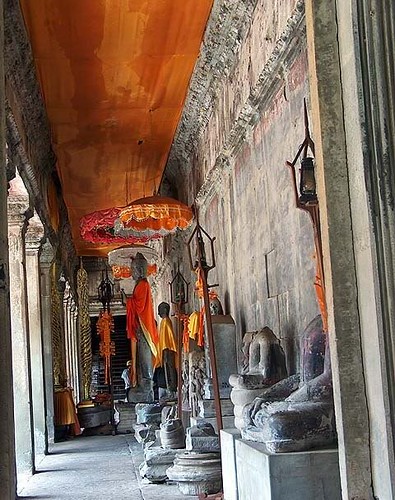
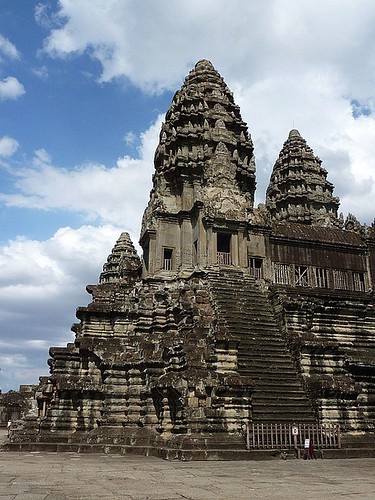
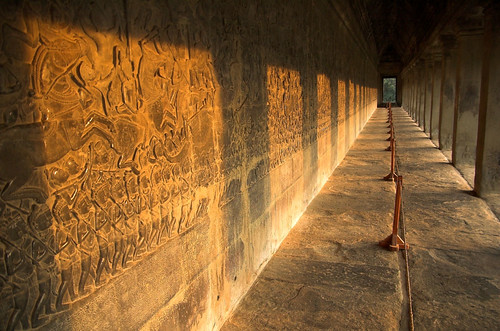
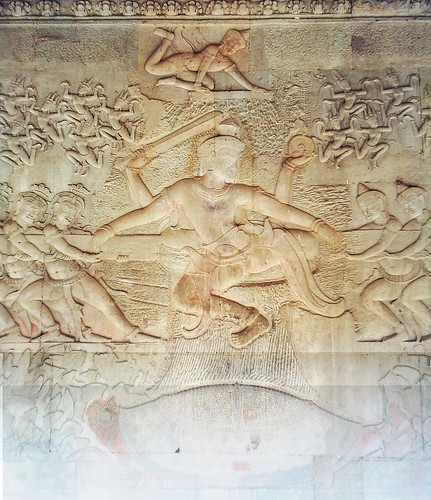
Could potentially be plus a superb page document unquestionably beloved viewing. It will be not really regular document offer the range to find out to become a thing. Degree
This is certainly what’s more a good report that i definitely enjoyed reading reviewing. It is actually no regularly that i contain the risk to discover a specific thing. bokep indonesia
I am frequently to blogging we genuinely appreciate your content regularly. Your content has really peaks my interest. I am about to bookmark your internet site and keep checking choosing data. Online Degree
Nice idea dude. May I know these tweets and so I may adhere to one ? Numerous thanks Plus my best prayers to the people close by Tokyo hopefully your are well along with comfortable University
Kinds text messages through this concept are often correct https://affordableassignments.co.uk/disseration“>Cheap / affordable / best dissertation writing services UK
observe how Once i had written these pages is quite first-rate
Shop Denim Tears Us Collection At Our Authentic Website With Worldwide Shipping & Huge Discount On All New Denim Tears Stock. denimtears-us.com
Also, it is highly likely that they might be willing to check your content, if it is offering more or equal value than that of the original article. contextual backlinks
I admire this article for the well-researched content and excellent wording. I got so involved in this material that I couldn’t stop reading. I am impressed with your work and skill. Thank you so much. 먹튀검증 순위
link888b luôn đặt trải nghiệm người chơi lên hàng đầu, cung cấp các dịch vụ giải trí uy tín, bảo mật cao và nhiều ưu đãi độc quyền.
The main reason why it’s always a lot better that one can significant researching preceding doing. You’ll be able to share improved page using this method. PROSTAVIVE
فتح شركة في دبي يعد خطوة مثالية للاستفادة من بيئة الأعمال المزدهرة والبنية التحتية المتطورة. دبي هي وجهة رائدة للمستثمرين بفضل التسهيلات التي تقدمها الحكومة، المناطق الحرة، والإعفاءات الضريبية. فيما يلي دليل شامل حول كيفية فتح شركة في دبي. تكلفة تأسيس شركة في دبي
ما هي تكاليف تسجيل العلامة التجارية؟ فتح شركة في دبي
This is exactly evenly a good material that i extremely extremely enjoyed reading viewing. It’s not regularly which i maintain opportunity to run a difficulty. https://pharmanoz.com/product/piascledine-300mg-osteoarthritis-anti-rheumatic-90-capsules
I am thankful to you for sharing this plethora of useful information. I found this resource utmost beneficial for me. Thanks a lot for hard work. tubegalore
利子傑牙醫的治療技術非常精湛,尤其是在牙齒美學修復方面。他的微笑設計技術讓許多患者找回自信,擁有自然又漂亮的笑容。 利子傑 牙醫
窗花圖案通常蘊含著吉祥的寓意,如「福」、「壽」或動物如魚(年年有餘)和龍鳳,讓人感受到對幸福與美好生活的期盼。 窗花
HappyToon 무료웹툰 : which has the largest number of webtoons currently being serialized. 무료웹툰
HappyToon 웹툰추천 : the fastest place to check free webtoon addresses. 웹툰추천
HappyToon 해피툰 : the fastest place to check free webtoon addresses. 해피툰
HappyToon 웹툰사이트 : the fastest place to check free webtoon addresses. 웹툰사이트
HappyToon 무료웹툰사이트 : the fastest place to check free webtoon addresses. 무료웹툰사이트
HappyToon 무료웹툰 : the fastest place to check free webtoon addresses. 무료웹툰
HappyToon 웹툰추천 : Introduction to the most popular free webtoons 웹툰추천
HappyToon 해피툰 : Introduction to the most popular free webtoons 해피툰
HappyToon 웹툰사이트 : Introduction to the most popular free webtoons 웹툰사이트
HappyToon 무료웹툰사이트 : Introduction to the most popular free webtoons 무료웹툰사이트
HappyToon 무료웹툰 : Introduction to the most popular free webtoons 무료웹툰
You really make it seem so easy with your presentation but I find this topic to be really something that I think I would never understand. It seems too complex and extremely broad for me. I’m looking forward for your next post, I’ll try to get the hang of it! Sugar Defender
Good day! I just want to give a huge thumbs up for the great info you might have here on this post. I will be coming again to your weblog for extra soon. Sugar Defender
Thanks for sharing superb informations. Your web-site is very cool. I am impressed by the details that you have on this web site. It reveals how nicely you perceive this subject. Bookmarked this web page, will come back for extra articles. You, my friend, ROCK! I found simply the info I already searched all over the place and just could not come across. What an ideal site. Sugar Defender
Great passion towards the subject is clearly visible in your writing. Your post made me feel like I want to continue learning about the focus area more. Thank you for the inspiration! lmc 8.4
Remarkable article, it is particularly useful! I quietly began in this, and I’m becoming more acquainted with it better! Delights, keep doing more and extra impressive! ssh.mp3juice.day
Hi there, I discovered your website by way of Google while searching for a comparable topic, your website came up, it looks good. I’ve bookmarked it in my google bookmarks. Serving Sra Survivors
thank you for taking the time to talk about this, I feel strongly about it and love mastering greater on this topic. If possible, as you benefit knowledge, might you mind updating your blog with more information? it’s far extraordinarily useful for me. Lightroom premium mod
I think this is an informative post and it is very beneficial and knowledgeable. Therefore, I would like to thank you for the endeavors that you have made in writing this article. All the content is absolutely well-researched. Thanks… Boot Aanleggen Amsterdam Noord
خدمة العملاء التي تقدمها الشركة تتميز بالاحترافية والاهتمام بتوفير تجربة مميزة للعملاء. تقدم الشركة استشارات مجانية لتحديد الاحتياجات وتوفير حلول مخصصة، كما تضمن الشفافية في التعاملات والأسعار التنافسية مع ضمانات طويلة الأمد على خدماتها. افضل شركة عزل الاسطح بالرياض
A very excellent blog post. I am thankful for your blog post. I have found a lot of approaches after visiting your post. kubet
Remarkable article, it is particularly useful! I quietly began in this, and I’m becoming more acquainted with it better! Delights, keep doing more and extra impressive! w88
Through this website https://affordableassignments.co.uk/nursing-assignments“>Cheap / affordable / best nursing assignment help UK
you’ll see the particular site, you must understand this kind of info.
This is a fantastic article, written with a lot of thought and care. I wholeheartedly agree with many of the points discussed. It’s an excellent read, and I appreciate the valuable insights shared.https://anonystories.com/
A masterpiece of an article! The information is presented in a way that’s easy to understand and apply. Thank you for this fantastic write-up. https://anonystories.com/
This would be the proper weblog for anybody who really wants to find out about this topic. You recognize a lot its practically tricky to argue along (not that I actually would want…HaHa). You certainly put a whole new spin with a topic thats been revealed for some time. Fantastic stuff, just excellent! 188bet ceo
I think you have a nice site here… i just happened to find it doing a yahoo search. anyway, excellent post.. i’ll be bookmarking this page for certain. hb88 vn.net
I do not even know how I ended up here, but I thought this post was good. I don’t know who you are but definitely you are going to a famous blogger if you are not already Cheers! 188bet
I think this is one of the most significant info for me. And i’m glad reading your article. But want to remark on some general things, The web site style is ideal, the articles is really great : D. Good job, cheers تصليح مرسيدس في دبي
Of je nu op zoek bent naar een chique diner, een gezellige lunch of een snelle hap, Nijmegen heeft voor ieder wat wils. De stad biedt een breed scala aan eetgelegenheden, van traditionele gerechten tot moderne culinaire hoogstandjes. Een restaurant in Nijmegen is altijd een uitstekende keuze voor een heerlijke maaltijd in een gastvrije en sfeervolle omgeving. Restaurant Nijmegen
With the amount of money being spent on addiction you would think there would be a cure. Just the time lost at work should be sufficient enough to get this thing fixed. drugs addictions 188 bet
This is exactly what I was looking for.. really simple to install, totally free just had to register to download, thanks situs slot gacor
Hi there, I discovered your website by way of Google even as looking for a related subject, your site got here up, it appears great. I have bookmarked it in my google bookmarks. link 188bet
Thank you so much as you have been willing to share information with us. We will forever admire all you have done here because you have made my work as easy as ABC. 浮気調査 探偵